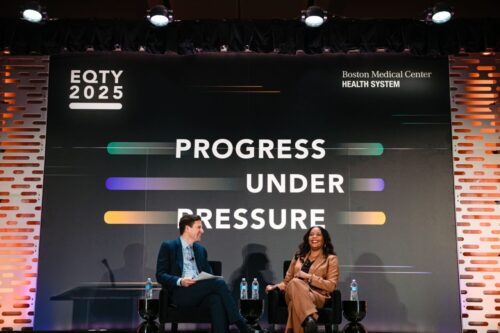
Appalachian Mountain Club
A parks prescription movement catching on among healthcare providers may be a low-cost intervention for some of children’s biggest healthcare issues.
It’s no secret that kids are spending less time than ever outside and more sedentary hours in front of screens, and it’s not hard to understand why. Devices with screens — phones, tablets, computers, and TVs — provide a convenient and addictive form of entertainment that can trump time spent outside in the eyes of young kids. And for city dwellers, additional considerations like personal safety, costs, and limited green space add to families’ list of reasons to stay inside.
Which is a shame, because nature is some of the best medicine. Even a small dose of the great outdoors can lower blood pressure, protect against obesity and diabetes, and improve immune function, research suggests. Time being in or near green spaces can also improve school behavior and achievement for kids. And for everyone, time spent in nature can enhance emotional wellbeing.
Among growing rates of childhood obesity and behavioral health problems, savvy hospitals and community health providers are paying attention. Those interested in low-cost — and fun — interventions for physical and emotional health problems related to inadequate physical activity are keying into partnerships with parks prescription programs, as they’re known. These wellness programs offer a more family-friendly and economical solution for patients than medication and repeat doctor’s appointments. A medical provider can write a prescription to one of these partner programs, which allows the family to sign up for free, guided outdoor activity before they leave the clinic that day.
The idea is catching on quickly. Today, 71 (and counting) such programs nationwide offer their own approach to addressing the needs of local communities.
Outdoors Rx, which was among the first of its kind when it was founded in 2013, is a Boston-based parks prescription program for kids from infancy through age 13 from the Appalachian Mountain Club (AMC). Its mission hinges on one beautifully simple concept, says director Angel Santos Burres: “Just go outside.”
Making the outdoors accessible
Easier said than done, though. In some Boston-area neighborhoods, green space is particularly hard to come by. Just by living in the city, kids and families have less green space in the immediate vicinity, and parents may be less likely to have a vehicle to take them elsewhere. Residents of underserved communities often have less disposable income and leisure time to invest in equipment and outings that would take them to national parks, for example.
Outdoors Rx is determined to show families in under-resourced communities that factors like these may not have to be barriers at all.
“We’re not saying take a month off and go hike Mount Kilimanjaro,” says Santos Burres, whose sights are instead set on helping families build lasting habits around everyday outdoor activity.

Emily Grilli-Scott, MPH, program manager for Outdoors Rx (left) leads groups of families through a guided outdoor activity that encourages exploration, community-building, and mindfulness. (Appalachian Mountain Club).
Families whose kids are prescribed Outdoors Rx can expect local, engaging programming that takes just 60 to 90 minutes. Weekly activities are led year-round by AMC staff and volunteers, and include animal-inspired outdoor yoga, fairy house building, and treasure hunts, to name a few from the recent calendar. Programming is catered to the green space available in the neighborhood, whether it’s a mile-long hike through the woods or an activity in a small pocket park. In the colder months, guides often have extra layers to lend, including hats, gloves, and weather-appropriate footwear.
“Not having any of these things shouldn’t be what keeps you from having a positive, comfortable experience outside,” says Emily Grilli-Scott, MPH, the program manager for Outdoors Rx.
Collaboration with the healthcare community
The parks prescription program has engaged with 54 medical and community partners to promote wellness among kids and families. Counted among them are Boston Medical Center (BMC), Boston Children’s Hospital, and Massachusetts General Hospital, as well as many community health centers.
At BMC, for example, the division of pediatric cardiology values its partnership with Outdoors Rx as part of its Fit4You program, a holistic initiative to improve outcomes for at-risk youth through physical activity and nutrition education.
“Childhood obesity affects 30% of kids, and preventive cardiology referrals are increasing,” says Sharon O’Brien, MD, chief of pediatric cardiology at BMC. According to her, programs like these can help patients stave off diabetes and hypertension, which can lead to decreased burden of disease and cost savings for the hospital. O’Brien, whose Fit4You program capitalizes on the ubiquity of smartphones to encourage and empower patients between appointments via regular mobile messaging, also writes prescriptions to Outdoors Rx to increase patients’ physical activity and overall wellness away from their screens.
The wellness benefits extend beyond the individual patient. When a child has a specific health need and is taken to various appointments, other children in the family are left at home or stuck in the waiting room, notes Santos Burres. If the parent has a spouse or partner, that person is also often left out. The whole family can do Outdoors Rx activities. “Everyone can be together. No one is excluded,” she says.
A parks prescription playbook
As a longtime leader in conservation, education, and the parks prescription movement, Outdoors Rx and the Appalachian Mountain Club have a few lessons-learned in curriculum streamlining and community engagement to share. While there’s no one right way to do a park prescription program, Grilli-Scott acknowledges, their hybrid model — involving medical stakeholders, community partners, and families — has been successful for creating an outdoor community that encourages ongoing participation. The team is gearing up to train more volunteer leaders and increase partnerships under the Outdoors Rx umbrella through a toolkit of best practices, which will allow them to expand their mission’s reach.
“We have the capacity to enable a lot more folks to do the work we’re doing and grow the number of people getting outside more,” says Grilli-Scott. “That’s a common goal across the AMC, across all park prescription programs — we’re really just trying to connect people to the outdoors and highlight the health benefits behind it.”


